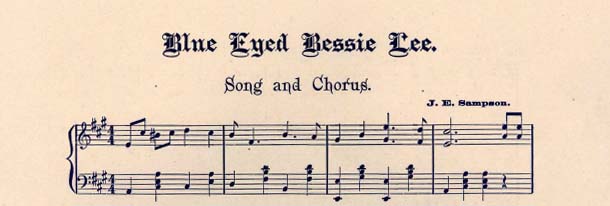
Historic Sheet Music Collection
Document Type
Score
Publication Date
1907
Lyrics
VERSE 1
What would you say if I asked you to wait an other year?
Oh! Don’t dear.
No I won’t dear.
My heart’s jumping up and down.
Oh! You silly little clown.
What would you say if I should run away, away from you?
Oh! Don’t dear.
No I won’t dear.
Love’s but a spell so poets tell.
Spell a little love for me.
CHORUS
When we are M.-A.-double R-I-E-D,
H-A-double P-Y we’ll be;
I’m going to B-U-Y you’ll see,
A nice little H-O-U-S-E.
We’ll have a B-A-B-Y boy
When I’m M-A-double R-I-E-D to Y-O-U.
When we are U.
VERSE 2
How will it be with a babe on your knee a little babe?
A boy, dear.
Papa’s joy dear.
I’ll sing little lullabies.
I’ll take baby when he cries.
How will it seem when baby will scream for his mam ma dear,
Be still, dear,
Yes he will, dear,
Life will be spent in sweet content.
Happy little family.
CHORUS
Recommended Citation
Cohan, George M., "When We Are M-A Double R-I-E-D" (1907). Historic Sheet Music Collection. 1727.
https://digitalcommons.conncoll.edu/sheetmusic/1727
The views expressed in this paper are solely those of the author.
Comments
Cohan & Harris present Victor Moore in his famous character Kid Burns in George M. Cohan's musical play The Talk of New York.
Photograph: George M. Cohan
Other Songs from the Musical Listed:
1. Put a Bet Down For Me
2. Mr. Burns of New Rochelle
3. Burning Up The Boulevard
4. I Want the World To Know I Love You
5. Busy Little Broadway
6. When a Fellow's on the Level with a Girl That's on the Square
7. I Want You
8. I Have a Longing for Long Acre Square
9. Drink With Me
10. Under Any Old Flag at All
11. When We Are M-A Double R-I-E-D
12. Gee, Ain't I Glad I'm Home
13. The Talk of New York Selections
F.A. Mills, 32 West 29th Street, New York.
Copyright 1907 by F.A. Mills, 32 West 29th Street, New York, English Copyright Secured.
Public Performance Prohibited Without Permission.
“Some of these resources may contain offensive stereotypes. Such materials should be seen in the context of the time period and as a reflection of the attitudes of the time. The items are part of the historical record, and do not represent the views of the library or the institution.”